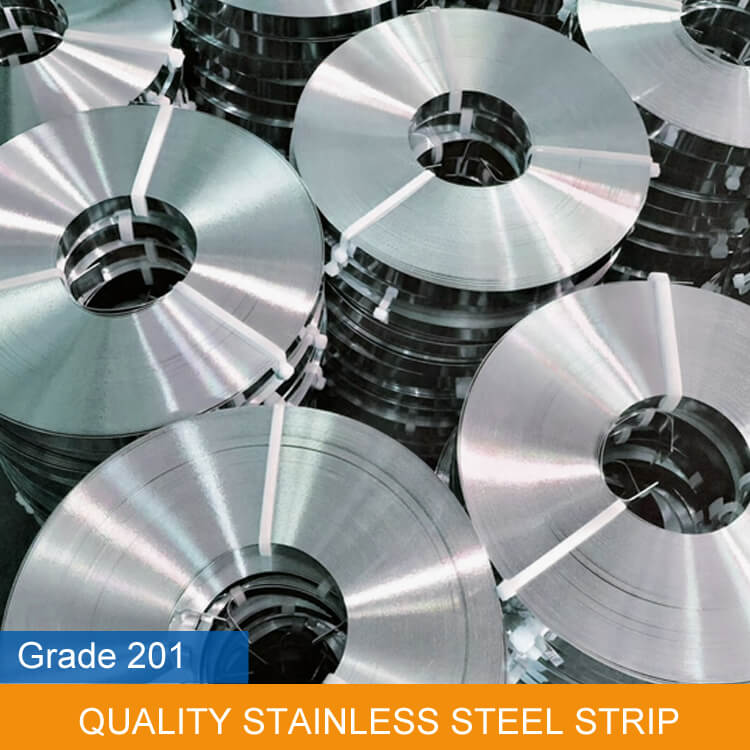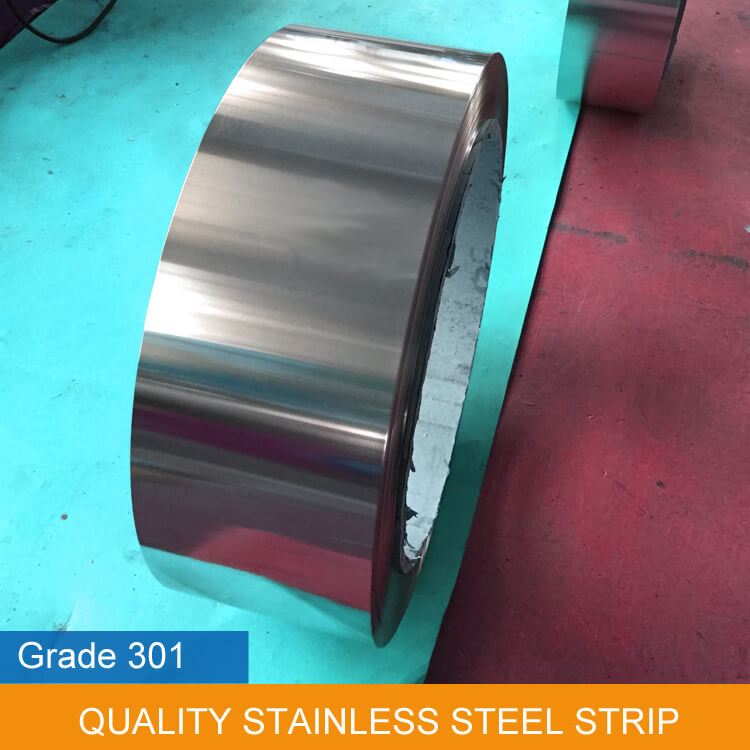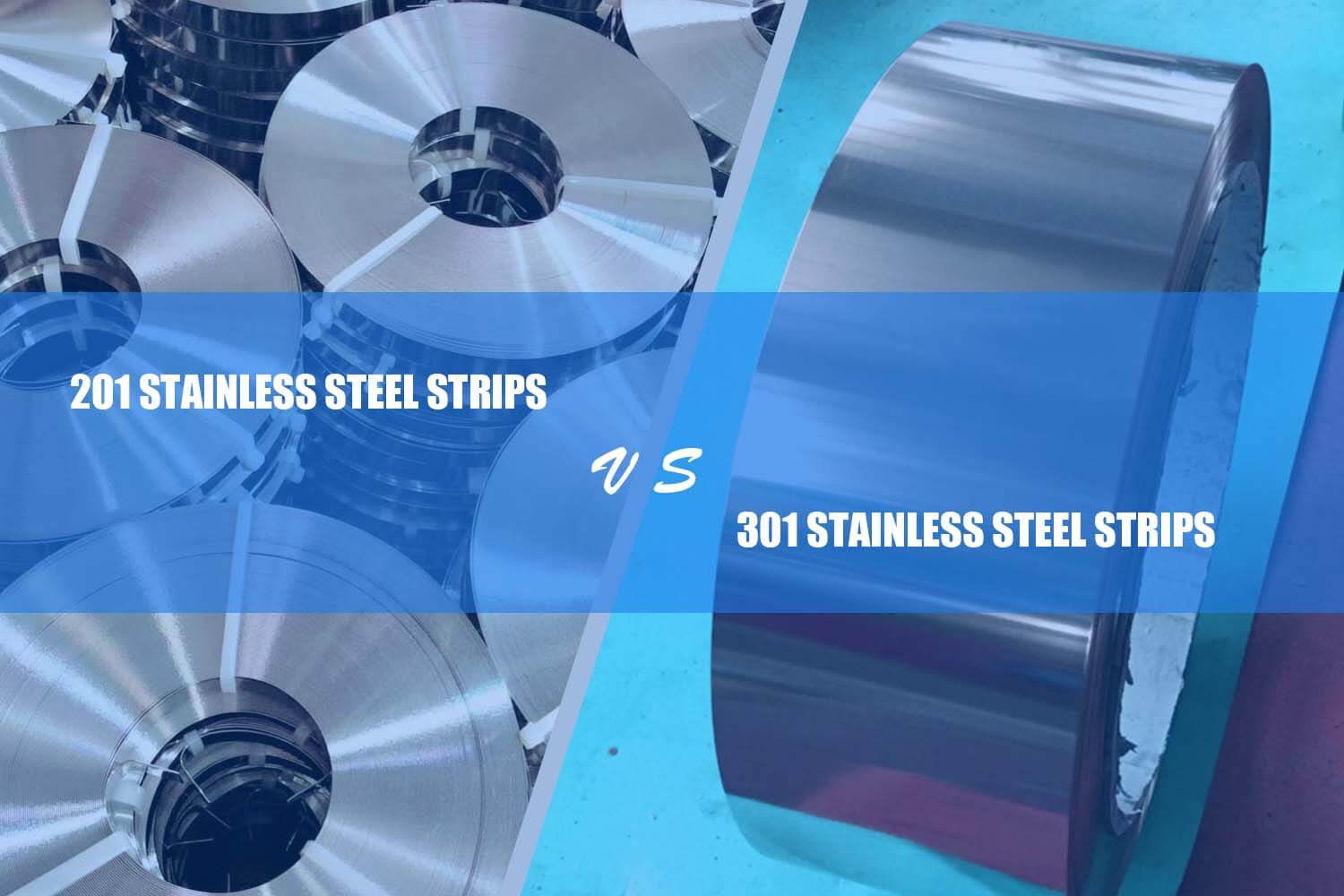If you are in the market for stainless steel strips and have no idea which ones to buy, stainless steel strips manufacturing expert is here to help.
Today we will be looking at the difference between 201 stainless steel strips and 301 stainless steel strips.
Let’s keep reading.
What is 201 Stainless Steel Strip?

Grade 201 stainless steel strip is a lower-cost alternative to the conventional Cr-Ni austenitic stainless steels, such as 304 stainless steel strips.
About half of the nickel content of 304 is replaced with alloy additions of manganese and nitrogen. This results in a higher strength than 304.
201 stainless steel strip has relatively lower ductility and formability compared to 301 stainless steel strip.
Grade 201 also has good welding characteristics and low temperature properties.
What is 301 Stainless Steel Strip?

301 stainless steel strip is an austenitic chromium-nickel stainless steel with a minimum nickel content of 6%. It is used in applications where high strength and resistance to corrosion are required, such as springs, electric components, stamping parts, connectors and belts.
The most common grade is AISI 301 (EN 1.4310).
It has excellent forming properties, good weldability and high strength. It also has good toughness for a stainless steel and has the highest yield strength of all the austenitic grades. This means that it can withstand high compressive loads without cracking or deforming excessively.
Differences Between 201 Stainless Steel Strips and 304 Stainless Steel Strips
Chemical Composition
The chemical components of grade 201 stainless steel strip is summarized in the following table:
| Grade | Standard | C | Si | Mn | P | S | Cr | Ni | Mo |
| 201 | ASTM A240 | ≤0.15 | ≤1.00 | ≤7.50 | ≤0.060 | ≤0.030 | 16.00-18.00 | 3.50-5.50 | – |
The chemical components of grade 301 stainless steel strip is summarized in the following table:
| Grade | C | Si | Mn | P | S | Cr | Ni | Mo |
| 301 | ≤0.15 | ≤1.00 | ≤2.00 | ≤0.045 | ≤0.030 | 16.00-18.00 | 6.00-8.00 | – |
Mechanical Properties
201 Stainless Steel Strip Mechanical Properties
| Property | Grade 201 |
| Yield Strength, min. (ksi) | 45 |
| Tensile Strength, min. (ksi) | 95 |
| Elongation, min. (%) | 40 |
| Hardness, max. (Rb) | 100 |
301 Stainless Steel Strip Mechanical Properties
“H” is the Japanese JIS G4313 cold-rolled stainless steel strip standard for springs production.
The H and mechanical properties detailed information of grade 301 stainless steel strip is summarized in the following table:
| Grade | Status | Hardness | Yield Strength | Tensile Strength | Elogation |
| HV | Mpa | Mpa | % | ||
SUS301 | ANN | ≤218 | ≥205 | ≥520 | ≥40 |
| 1/4H | 250-310 | ≥470 | ≥780 | ≥25 | |
| 1/2H | 310-370 | ≥510 | ≥930 | ≥18 | |
| 3/4H | 370-430 | ≥745 | ≥1130 | ≥5 | |
| FH | 430-490 | ≥1030 | ≥1320 | ≥4 | |
| EH | 490-550 | ≥1275 | ≥1570 | ≥3 | |
| SH | ≥550 | ≥1550 | ≥1750 | ≥1 |
Applications
What Is 201 Stainless Steel Strip Used For?
Grade 201 stainless steel strip has good formability and corrosion resistance and this makes it suitable for below applications such as kitchen equipment and catering equipment.
The good strength ensures suitability in applications such as stainless steel banding straps, clamps, brackets and cable ties.
What Is 301 Stainless Steel Strip Used For?
Due to the high strength and excellent corrosion resistance, quality grade 301 stainless steel strips are widely used for following applications.
- Industrial springs
- Conveyor belt
- Connectors
- Switch components
- Aircraft components
- Electric components
- Precision stamping parts
- Hardware












